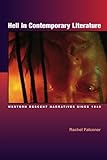Hell in Contemporary Literature : Western Descent Narratives since 1945 / Rachel Falconer.
Material type: TextPublisher: Edinburgh : Edinburgh University Press, [2022]Copyright date: ©2004Description: 1 online resource (272 p.)Content type:
TextPublisher: Edinburgh : Edinburgh University Press, [2022]Copyright date: ©2004Description: 1 online resource (272 p.)Content type: - 9780748617630
- 9781474468138
- 809.39382023 22
- PN56.H38 F35 2005
- online - DeGruyter
| Item type | Current library | Call number | URL | Status | Notes | Barcode | |
|---|---|---|---|---|---|---|---|
 eBook
eBook
|
Biblioteca "Angelicum" Pont. Univ. S.Tommaso d'Aquino Nuvola online | online - DeGruyter (Browse shelf(Opens below)) | Online access | Not for loan (Accesso limitato) | Accesso per gli utenti autorizzati / Access for authorized users | (dgr)9781474468138 |
Frontmatter -- Contents -- Acknowledgments -- Introduction: Descent and Return - the katabatic imagination -- Chapter 1 Hell in our time -- Chapter 2 Chronotopes of hell -- Chapter 3 Auschwitz as hell -- Chapter 4 Surviving with ghosts: second-generation holocaust narratives -- Chapter 5 Katabatic memoirs of mental Illnes -- Chapter 6 Engendering dissent in the underworld -- Chapter 7 Postmodern hell and the search for roots -- Chapter 8 East-west descent narratives -- Epilogue: Katabasis in the twenty-first century -- Apendix: Primo Levi, 'Map of reading' -- Bibliography -- Index
restricted access online access with authorization star
http://purl.org/coar/access_right/c_16ec
What does it mean when people use the word 'Hell' to convey the horror of an actual, personal or historical experience?Now available in paperback, this book explores the idea that modern, Western secular cultures have retained a belief in the concept of Hell as an event or experience of endless or unjust suffering. In the contemporary period, the descent to Hell has come to represent the means of recovering - or discovering - selfhood. In exploring these ideas, this book discusses descent journeys in Holocaust testimony and fiction, memoirs of mental illness, and feminist, postmodern and postcolonial narratives written after 1945. A wide range of texts are discussed, including writing by Primo Levi, W.G. Sebald, Anne Michaels, Alasdair Gray, and Salman Rushdie, and films such as Coppola's Apocalypse Now and the Matrix trilogy. Drawing on theoretical writing by Bakhtin, Levinas, Derrida, Judith Butler, David Harvey and Paul Ricoeur, the book addresses such broader theoretical issues as: narration and identity; the ethics of the subject; trauma and memory; descent as sexual or political dissent; the interrelation of realism and fantasy; and Occidentalism and Orientalism.Key FeaturesDefines and discusses what constitutes Hell in contemporary secular Western culturesRelates ideas from psychoanalysis to literary traditions ranging from Virgil and Dante to the presentExplores the concept of Hell in relation to crises in Western thought and identity. e.g. distortions of global capitalism, mental illness, war trauma and incarcerationExplains the significance of this narrative tradition of a 'descent to hell' in the immediate political context of 9/11 and its aftermath
Mode of access: Internet via World Wide Web.
In English.
Description based on online resource; title from PDF title page (publisher's Web site, viewed 29. Jun 2022)


